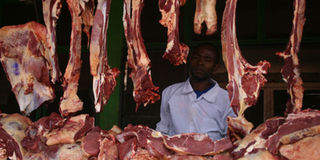May inflation drops to 5.4 %

A butcher waits for customers at his shop in Nakawa Market, Kampala. A reduction in inflation has been said to be mainly as a result of the decrease in food prices. PHOTO BY Stephen Otage
What you need to know:
Factor. Decline attributed to decrease in food prices due to increased production
Kampala.
Uganda’s headline inflation for May eased to 5.4 per cent down from 6.7 per cent the previous month.
The downward trend by 1.3 per cent, according the Uganda Bureau of Statistics (Ubos), was mainly as a result of decrease in food prices due to increased production.
“The decline in inflation does not mean necessarily that prices have dropped although relatively, price levels have also come down,” said Mr Vincent Nsubuga Musoke, a Ubos official at the release of the Consumer Price Index (CPI).
CPI, the official measure of inflation released by Ubos on Friday, attributed the decline to annual food crops inflation reducing from 17.6 per cent from 25.4 per cent in April.
Ubos also indicated a drop in the annual core inflation to 3.3 per cent from 3.4 per cent while the Energy Fuel and Utility (EFU) inflation also eased to 3.7 per cent from 4.1 per cent during the same period.
Mr Musoke said food, both agricultural and manufactured products, which is the major driver of prices of other commodities, remained stable entirely.
“There has been significant increase in demand but supply has also increased on one hand due to the competition in the market,” he said.
The price of a kilogramme of sugar, for instance, costs about Shs2,400 compared to Shs3,500 from last year, while a bag of cement costs Shs25,500, down from Shs28,000.
Annual food inflation decreased to 8.2 per cent compared to 12.2 per cent and non-food inflation remained 4.2 per cent as seen last month.
Neighbouring Kenya is experiencing “a significant acceleration” in inflation currently at 7.3 per cent. Data from the Kenya National Bureau of Statistics indicates that the rate of inflation was driven up by rising costs of energy and foodstuffs.
However, at 7.3 per cent, the country’s rate of inflation is still within the government’s medium term target of 7.5 per cent.
what inflation means to an ordinary Ugandan
While a rise in inflation erodes people’s purchasing power, a reduction (in positive digits), doesn’t necessarily mean that people will pay less for goods and services, rather it’s just a slowdown in the pace at which prices are increasing.
The Standard Chartered Bank head of corporate affairs Herbert Zake, however said, whereas May’s CPI has decelerated sharply to only 5.4 percent, “We remain wary of the unintended consequences of a looser fiscal backdrop, and therefore see limited room for any new easing. Equally however, there is little immediate pressure for tightening,” he said.
Bank of Uganda had forecast annual headline inflation to be in the range of 4-5 per cent in the next few months and 5.5 - 6.5 per cent over the next 12 months, but warned of possible stronger inflationary pressure risks from possible exchange rate depreciation, stronger fiscal demand from the fiscal sector and increase in food prices due to food supply shortfalls.




